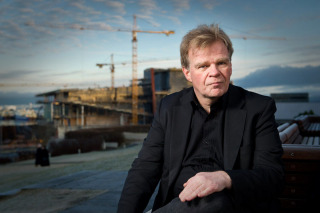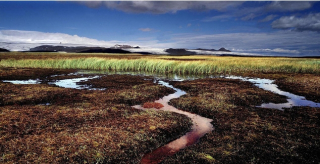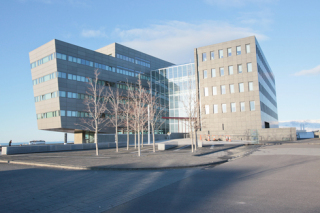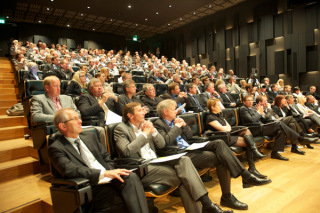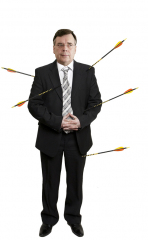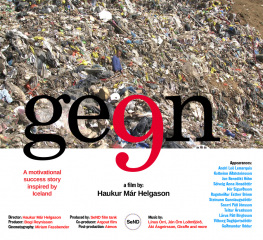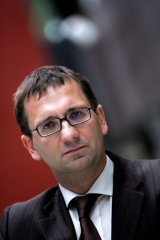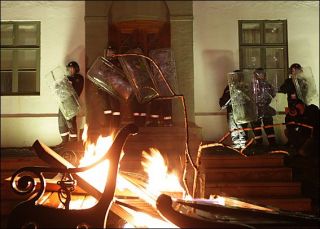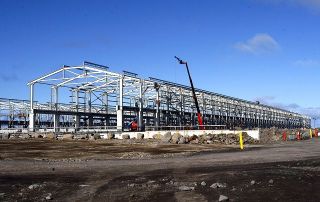'Economic Collapse'
Tag Archive
Aug 31 2011
1 Comment
Cultural, Economic Collapse, Ge9n, Repression, RVK9
After a successful première in June this year – one critic describing the film as a “ticking timebomb” – Haukur Már Helgason’s documentary about The Reykjavík Nine is finally about to be shown in cinemas. From the 9th of September the film, named ‘Ge9n’ (‘A9ainst ’ in English, bearing the subhead ‘A motivational success story inspired by Iceland’), will be screened both with and without English subtitles in Bíó Paradís, an independently run cinema in Hverfisgata, Reykjavík. Information about international screening will be announced later but in the meantime, if not in Iceland, enjoy the film’s recently premièred trailer here below.
Ge9n trailer (EN) from SeND film tank on Vimeo.
If not familiar with The Reykjavík Nine – nine people who were charged and later acquitted of attacking Iceland’s parliament after wanting to enter the building’s public gallery on December 8th 2008, a few months after Iceland’s economic collapse – then you can read through the whole case on the nine’s official support website. Check out a short, sharp and informative video from the 2011 London Anarchist Bookfair or download a brochure that was published and distributed shortly before the case’s main procedure, which took place in January 2011.
Also take a look at Ge9n’s official website where you can find a very nice poster, a press kit and the film’s title song: Stóriðjuverkefnið mig, composed and performed by Linus Orri and Þórir Bogason. Finally, read a review of the film’s première (the one mentioning the “ticking timebomb”) and an exclusive interview with the film’s director, Haukur Már Helgason (p. 30-32).
Aug 27 2011
Cultural, Democracy deficit, Economic Collapse, IMF, SIC Report
The following chapter is from ‘Bankastræti Núll’, the latest book by poet and author Einar Már Guðmundsson, translated and originally published in The Reykjavík Grapevine, parallel to an introduction to Einar by Alda Kravec. The introduction says that the book “opens with the narrator’s lament: the current political situation has stifled his ability to write poems to his lover. Although he foresees a future where “reality wakes up” and poets can once again sing the praises of love and nature, the resounding sound of social injustice presently overwhelms him and beckons him to first engage in the struggle against the free reign of the stock exchange, privatisation and greed.”
It is written somewhere that all cats are grey in the dark, but here in Iceland, official reports are all black, no matter how bright it is outside. Alþingi’s Investigative Commission’s Report is black. The Central Bank’s Report on the status of household debt is black. And the government and International Monetary Fund’s Memorandum of Economic and Financial Policies is also black, dark as a coal mine, and sure enough, it was drafted in April, the cruellest month. It is a reminder of the misery that the IMF has presided over in countries all over the world, and directly refutes the notion that the IMF plans to apply different methods than those it has adhered to until now.
In Greece, the public has risen up against the Fund’s plans, but here the labour movement and employers get into bed with it and are almost more devout than the Pope in getting investors to come here with their baggage of offshore profits and dummy corporations. In one district, where neo-liberals have sold everything and there is nothing left to mortgage except the harbour, efforts are being made to set a precedent by selling natural resources through a shelf company just so politicians can save face after having handed over the entire district to their associates and relatives on a silver platter. Read More
Jul 23 2011
Century Aluminum, Democracy deficit, Ecology, Economic Collapse, Energy Master Plan, Guðmundur Páll Ólafsson, Hengill, Kerlingafjöll, Krafla and Þeistareykir, Landsvirkjun, Reykjanes, Rio Tinto Alcan, Torfajökull, Tungnaá, Þjórsá
The making of Iceland’s Energy Master Plan, a framework programme concerning the exploitation and protection of the country’s natural resources, which has been in the making since 1999, has reached a critical state as a report on the process’ second phase was published in the beginning of July. The report includes a list of more than 60 areas, arranged from the perspectives of both protection and exploitation, which is supposed to lay the foundation for a final parliamentary resolution concerning the Master Plan. While those in favour of further exploitation, parallel to the continuous build-up of heavy industry, seem generally happy with the report, environmentalists are both sceptical and critical, stating that the exploitation value was always in the forefront of the process.
Like explained on the project’s official website the process was “split into two phases. The first phase, 1999–2003, evaluated and ranked 20 large-scale hydro-power options, mostly located in the highlands, and the same number of geothermal options in 8 high-temperature areas.” The second phase was supposed to “rank all the options to produce the final result,” including “an evaluation of whether some areas should be conserved completely, without any energy-harnessing activities.” Proposed power projects were said to be “evaluated and categorised on the basis of efficiency, economic profitability, and how they will benefit the economy as a whole,” while the “the impact on the environment, nature, and wildlife” was also supposed to be evaluated, “as well as the impact on the landscape, cultural heritage and ancient monuments, grazing and other traditional land use, outdoor activities fishing, and hunting.” Read More
Jul 16 2011
1 Comment
Century Aluminum, Corruption, Economic Collapse, Economics, Greenwash, H.S. Orka, Hengill, Reykjavik Energy
By Anna Andersen, photos by Alísa Kalyanova. Originally published in The Reykjavík Grapevine.
Overrun by Viking ambition, Reykjavík Energy built headquarters fit for Darth Vader, expanded ambitiously, dabbled in tiger prawn farming and flax seed production, went into the fibre optics business, invested in a new geothermal plant, speculated in places like Djibouti, and finally managed to run itself so completely into the ground that foreign investors will no longer offer the company loans.
In hopes of rescuing its multi-utility service company from the depths of abyss, the city of Reykjavík stepped in this March with a 12 billion ISK (105 million USD) loan, which is nearly its entire reserve fund set aside for the company, but still only a fraction of the company’s massive foreign debt of 200 billion ISK (1.7 billion USD).
With thousands of captive lifetime subscribers and a means of producing energy at very little cost, the company had all the makings of a cash cow. So what happened to Reykjavík Energy, an entity that less than a decade ago was a perfectly viable, municipally owned company providing the city with basic utilities: cold water, hot water and electricity? Read More
Jun 29 2011
2 Comments
ALCOA, Alterra Power/Magma Energy, Century Aluminum, Corruption, Economic Collapse, Geothermal Cluster, Geothermal Energy, Greenwash, H.S. Orka, Helguvík, Landsvirkjun, Media bias, Reykjavik Energy
Dozens of Icelandic companies and institutions, all directly connected to the heavy industrialization of Iceland, have established a co-operating forum concerning the development of the so-called “Icelandic geothermal cluster”. The forum, which was formally established yesterday, June 28th, is originally a conception by Dr. Michael Porter, professor at Harvard Business School and known as “a leading authority on company strategy and the competitiveness of nations and regions.” Interviewed by a news-report TV show Kastljós, Porter, who was in Iceland to take part in the forum’s formal establishment, said that Icelanders are “too cautious” when it comes to “using the opportunities that consist in geothermal energy and the nation’s expertise on the issue.” Contrary to Porter, environmentalists and
Iceland’s National Energy Authority fear the overexploitation of geothermal resources. Read More
Jun 23 2011
1 Comment
Corruption, Democracy deficit, Economic Collapse, Laws, Repression, RVK9, SIC Report
By Snorri Páll Jónsson Úlfhildarson
Originally published in The Reykjavík Grapevine
A little more than a year ago, several Icelandic bankers were arrested and kept in custody in relation to the Special Prosecutor’s investigation into the 2008 economic collapse, its antecedents and causes. Appearing in political TV talk show Silfur Egils shortly afterwards, French-Norwegian magistrate Eva Joly, who at that time served as the Prosecutor’s special assistant, talked about how society does not expect—and has problems to deal with—politically and economically powerful people being arrested, interrogated and possibly sentenced.
Eva Joly was right. And the reason? Habit. Whether a journalist, police officer, lawyer, judge or a powerless citizen, in a civilised society based on dualistic ideas of good and evil, one is most likely unable to recognise well-dressed and eloquent people—with possessions and power in their pockets—as anything other than good. During the interview, Eva compared those people with drug users and dealers that are brought to court, who generally are immediately seen by society as criminals deserving to face “justice”. Another rightful comparison would be political dissidents. Read More
Jun 08 2011
Cultural, Economic Collapse, Ge9n, Repression, RVK9
This weekend a new documentary about the Reykjavík Nine will be premiered in Iceland. The film, called
A9aginst (Ge9n in Icelandic), is directed by author, philosopher and filmmaker Haukur Már Helgason and will be shown at the documentary film festival Skjaldborg, in Patreksfjörður (on the Westfjords), on June 11th. According to the film’s website, “this feature-length documentary is a portrait, or rather nine portraits, of people charged and prosecuted in Iceland for ‘attacking parliament’ in December 2008.”
In a conversation with online newspaper Róstur, the director explained briefly his motivation for making the film:
I make the film… well, I guess because there one catches a glimpse of some potential, some possibility, a will for another kind of society, in the minds of a group of people who the state power has, by charging them, defined as a certain set. The charges basically call for an investigation about who these people, defined as enemies, are, and which thoughts someone somewhere can find so dangerous – because it was clear from the beginning that it was not the “action” in the parliament that was considered so dangerous. Read More
May 11 2011
Búðarháls, Democracy deficit, Economic Collapse, Economics, Kárahnjúkar, Landsvirkjun, Tungnaá, Þjórsá
Landsvirkjun, Iceland’s national energy company, plans to build fourteen power plants in the next 15 years; ten hydro dams and four geothermal plants, costing between 4,5 and 5 billion US dollars. If the plans go ahead Landsvirkjun will increase its electricity production by eleven terawatt hours (TWh), resulting in annual production of 40 TWh. “A new Kárahnjúkar dam is on the cards,” said Katrín Júlíusdóttir, minster of industry, when discussing energy plans in parliament recently.
Landsvirkjun’s new plan was presented at the company’s annual general meeting, which took place on April 15th. According to the company’s director, Hörður Árnason, the planned power plants are to be built in several rivers, including Þjórsá, Tungnaá and Hólmsá, as well as geothermal areas in the north of Iceland. The construction of Búðarháls Dam in Tungnaá has already started and Landsvirkjun plans to start energy production there in 2013, whereas all the other options are still being looked at in the making of a framework programme concerning the use and protection of Iceland natural resources. Read More
Mar 01 2011
Climate Change, COP15, Democracy deficit, direct action, Economic Collapse, Mark Kennedy, Repression, RVK9, Saving Iceland, Workers Rights
By Tord Björk
Social Forum Journey / Malmö-Belem-Istanbul
Abstract: This article looks at how the national mass protests against neoliberal regimes in Iceland, Tunisia, Egypt and other African and Arabic countries and the Wisconsin in the US are linked with the climate justice movement. Both national protests and the climate justice movement are developing unevenly. National protests in some hot spots, the climate campaigning more even all over the world. By looking at how countries like Denmark and its organized civil society acts it can be possible to understand how the struggle both for defensive goals and constructive solutions can strengthen each other by what lacked in Denmark but exists on the global level. That is solidarity against repression and building resistance which enables solutions uniting anti-neoliberal struggles in general and specific areas. Read More
Jan 31 2011
4 Comments
Alterra Power/Magma Energy, Century Aluminum, Ecology, Economic Collapse, Geothermal Energy, H.S. Orka, Helguvík, Hengill, Krýsuvík, Landsvirkjun, norðurál, Reykjanes, Reykjavik Energy, Sigmundur Einarsson, Þjórsá
Century Aluminum (Nordural) intends to build an aluminium smelter at Helguvík for producing 250.000 tpy, using 435 MW of electricity. At one point the intended size grew to 600.000 tpy and 625 MW of electricity but those plans have been cancelled. The first phase of the smelter was expected to start in 2010 and the 250.000 ton should be reached in 2013. Now there are already some big structures at the smelter site but no energy has been produced and moreover, there is no energy available.
Sigmundur Einarsson, a geologist at the Icelandic Institute of Natural History, has written some articles on this matter (in Icelandic). He has tried, amongst a number of other environmental scientists, to warn the Icelandic government about a new kind of collapse, an energy collapse due to following far too optimistic speculation of irresponsible people. Read More
